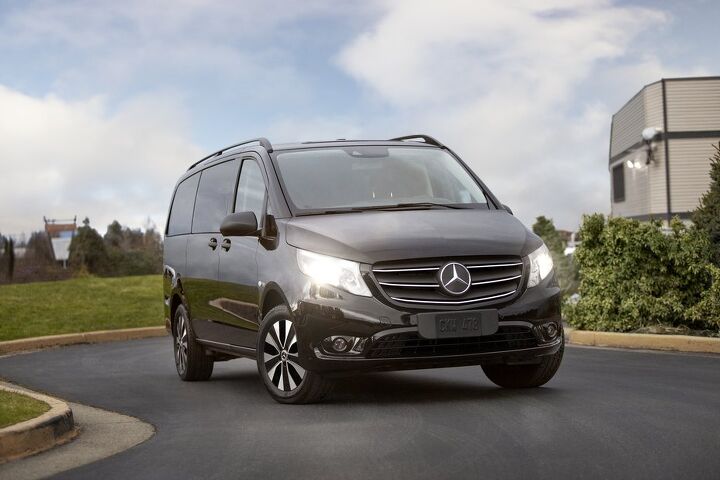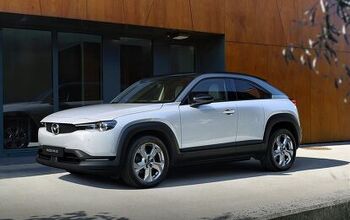Mercedes Pulling Metris Van From U.S. Market

Reports that Mercedes would be removing its Metris van from the U.S. market emerged over the weekend, with the German automaker confirming the decision.
Despite carrying a larger price tag than the competition (starting around $35,000), the Metris often compares favorably from behind the wheel when the maximum cargo capacity and price aren't the chief concerns. Unfortunately, those tend to be very important items when people are shopping for working vehicles and the Metris' sales numbers have reflected that. Mercedes has struggled to reach 10,000 deliveries annually and the Metris volume is routinely bested by models like the smaller Ford Transit Connect or the ancient, full-size Chevrolet Express.
Those aren't even the most popular alternatives, just a couple of random examples highlighting that the model's European sizing might not have played well in the United States. The Metris tends to be a little larger than the city vans preferred by small businesses and independent tradesmen — but dwarfed by full-sized vans focused entirely on capacity. The German commercial van's interior also lacks the same level of luxury expected from other products wearing the Mercedes badge. While it's a cut above some other working vehicles designed to ferry passengers, it's universally outclassed by the features found on the minivans occupying today the market (e.g. Chrysler Pacifica, Honda Odyssey, Toyota Sienna) which are also probably the closest to the Metris in overall size.
But it may be unfair to say Mercedes is pulling out wholly due to a lack of interest when Metris sales were improving ahead of the pandemic and on pace to break a record this year. In fact, the manufacturer would probably rather we ignore the glaring volume issue and focus on its decision to eliminate the turbocharged 2.0-liter inline-four that goes into the model. On Friday, Automotive News reported that it had intercepted a dealer memo stating that the motor would be discontinued, which likewise spells doom for certain versions of the larger Mercedes Sprinter van.
"As a result, the Mercedes-Benz Metris and gasoline Sprinter models will no longer be offered in the U.S. market after Q3 2023," the brand's U.S. vice president of commercial vehicles, Nicolette Lambrechts, said in the letter.
The Sprinter van's vastly more popular diesel option should stick around while the company prepares to electrify as many vehicles as is feasible. But something tells me the Metris would have been yanked from our market even if that wasn't the case. Considering the manufacturer has only sold around 60,000 units in America since 2015, there was likely no way MB Vans would have tried to press on. Mercedes is also starting to shift back upmarket, abandoning some of its lower-margin products that sticker for less.
[Images: Mercedes-Benz]
Become a TTAC insider. Get the latest news, features, TTAC takes, and everything else that gets to the truth about cars first by subscribing to our newsletter.

A staunch consumer advocate tracking industry trends and regulation. Before joining TTAC, Matt spent a decade working for marketing and research firms based in NYC. Clients included several of the world’s largest automakers, global tire brands, and aftermarket part suppliers. Dissatisfied with the corporate world and resentful of having to wear suits everyday, he pivoted to writing about cars. Since then, that man has become an ardent supporter of the right-to-repair movement, been interviewed on the auto industry by national radio broadcasts, driven more rental cars than anyone ever should, participated in amateur rallying events, and received the requisite minimum training as sanctioned by the SCCA. Handy with a wrench, Matt grew up surrounded by Detroit auto workers and managed to get a pizza delivery job before he was legally eligible. He later found himself driving box trucks through Manhattan, guaranteeing future sympathy for actual truckers. He continues to conduct research pertaining to the automotive sector as an independent contractor and has since moved back to his native Michigan, closer to where the cars are born. A contrarian, Matt claims to prefer understeer — stating that front and all-wheel drive vehicles cater best to his driving style.
More by Matt Posky
Latest Car Reviews
Read moreLatest Product Reviews
Read moreRecent Comments
- Slavuta CX5 hands down. Only trunk space, where RAV4 is better.
- Kwik_Shift_Pro4X Oof 😣 for Tesla.https://www.naturalnews.com/2024-05-03-nhtsa-probes-tesla-recall-over-autopilot-concerns.html
- Slavuta Autonomous cars can be used by terrorists.
- W Conrad I'm not afraid of them, but they aren't needed for everyone or everywhere. Long haul and highway driving sure, but in the city, nope.
- Jalop1991 In a manner similar to PHEV being the correct answer, I declare RPVs to be the correct answer here.We're doing it with certain aircraft; why not with cars on the ground, using hardware and tools like Telsa's "FSD" or GM's "SuperCruise" as the base?Take the local Uber driver out of the car, and put him in a professional centralized environment from where he drives me around. The system and the individual car can have awareness as well as gates, but he's responsible for the driving.Put the tech into my car, and let me buy it as needed. I need someone else to drive me home; hit the button and voila, I've hired a driver for the moment. I don't want to drive 11 hours to my vacation spot; hire the remote pilot for that. When I get there, I have my car and he's still at his normal location, piloting cars for other people.The system would allow for driver rest period, like what's required for truckers, so I might end up with multiple people driving me to the coast. I don't care. And they don't have to be physically with me, therefore they can be way cheaper.Charge taxi-type per-mile rates. For long drives, offer per-trip rates. Offer subscriptions, including miles/hours. Whatever.(And for grins, dress the remote pilots all as Johnnie.)Start this out with big rigs. Take the trucker away from the long haul driving, and let him be there for emergencies and the short haul parts of the trip.And in a manner similar to PHEVs being discredited, I fully expect to be razzed for this brilliant idea (not unlike how Alan Kay wasn't recognized until many many years later for his Dynabook vision).





































Comments
Join the conversation
I am sure somewhere, somebody is saddened by this.
I'm guessing this thing's gonna come back to the U.S. wearing a Freightliner badge.